The Dominican Republic plans to expel up to 10,000 Haitian migrants per week, seemingly unconcerned about the United Nations’ call to end forced returns to Haiti due to the surge in gang violence in the country. The Dominican presidential spokesman stated that the operation aims to reduce excessive migrant populations in Dominican communities and that expulsions to Haiti would begin immediately. Reports from the UN indicate that over 3,600 people have been killed in Haiti in the first half of 2024 due to senseless gang violence, leading to more than 700,000 internally displaced Haitians and over 5.4 million people facing acute hunger.
Haiti has been plagued by violence for years, with armed groups linked to political and business leaders fighting for control of territory. The situation worsened in February when gangs targeted prisons and other state institutions in Port-au-Prince. This surge in violence led to the resignation of the prime minister and the deployment of a UN-backed multinational police force, which has been under-funded and unable to control the gangs. The Dominican government cites its decision to expel Haitian migrants without immigration status as a response to the slow international efforts to restore stability in Haiti.
President Luis Abinader, known for his hardline stance against migration from Haiti, has already expelled 250,000 undocumented Haitians in 2023 alone. The latest plan indicates a doubling of this number in just a year, leading to criticism from rights groups accusing the Dominican authorities of enacting racist immigration policies. These expulsions invoke historical anti-Haitian discrimination, with accusations of racial profiling and unjust deportations causing the separation of families in the Dominican Republic. Amid rising violence in Haiti, the UNHCR has urged governments not to deport Haitians back to the country, emphasizing the threats to their lives, safety, and freedom.
The historical context of Haitian migration to the Dominican Republic dates back to the US occupation of Haiti in 1915, leading to mass migration to the neighboring country. Despite many Haitians living in the Dominican Republic for decades, fear-mongering about the “Haitianisation” of Dominican society persists, with accusations of racial profiling and persecution based on race. The Dominican government’s expulsions have fuelled concerns about human rights violations and discrimination against Black Dominicans, given the predominantly mixed-race population in the country. The expulsions not only represent a violation of international refugee protection guidelines but also exacerbate tensions between the two nations.
As the violence and instability in Haiti escalate, with armed gangs controlling most of Port-au-Prince, the international community faces mounting pressure to address the humanitarian crisis. The UNHCR’s call to refrain from deporting Haitians back to the country reflects the urgent need to protect vulnerable populations facing insecurity and violence. The Dominican Republic’s decision to forcibly expel Haitian migrants amid the ongoing crisis exemplifies the challenges faced by policymakers in addressing migration issues within the context of regional instability and human rights violations. Efforts to restore stability and security in Haiti must be prioritized to prevent further displacement and suffering among the population.

